- Home
- Tim Willocks
Blood-Stained Kings
Blood-Stained Kings Read online
Copyright © 1995 by Tim Willocks
All rights reserved under International and Pan-American Copyright Conventions. Published in the United States by Random House, Inc., New York.
Originally published in the United Kingdom by Jonathan Cape, a division of Random House UK, London, in 1995.
Library of Congress Cataloging-in-Publication Data
Willocks, Tim.
Bloodstained kings / Tim Willocks.
p. cm.
eISBN: 978-0-307-55476-5
I. Tide.
PS3573.I456558B57 1997
813‘.54—dc21 97-1523
Random House website address: http://www.randomhouse.com/
v3.0_r2
And the LORD said unto Satan,
Whence comest thou? Then Satan
answered the Lord, and said, From
going to and fro in the earth, and
from walking up and down in it.
JOB: 1.7
CONTENTS
Part One
COLD DAY IN HELL
Part Two
OHOOPEE RIVER
BOTTOMLANDS
Part Three
THE STONE HOUSE
A Plantation Farm on the Mississippi Delta.
Twenty Years Ago.
See the fatman. See him run.
See his legs—massive in their strength, in their flight—-plunge and flounder and suck through the muddy deltan ooze. Feel the clinging weight of that melted clay, that driven rain, that night; that steaming dark. Know the spasms in his gut as he feels the gaze of the great grandfather spirit: appalled by the horror the fatman leaves behind him. A brilliant shard of lightning cleaves the sky. It floods the midnight campo with incandescent witness: the fatman is there.
He is running. He is running.
But the earth cannot stop him, nor her gods, nor the gone dead souls that grieve upon the wind. For he cannot be killed, the fatman. No. Not this night. He cannot be stopped. And the pounding of his vein and blood, the pressure in his skull, the encoiled writhings of his bowel come not from fear. As the futile thunder dies, enraged, the screams return. The screams of a woman. They seek him out across the harrowed field. But these screams too—of a pain too wide and deep for human knowing—these screams too must stumble and fall unheeded. They do not pierce the fatman’s heart. They cannot stop him in his course. He will not let them, though he could. The blood on his hands—and flung in splashed, diluted gouts across his gale-drenched coat—is not his own. For now the losing of blood is the work of others: others past; others yet to come.
And still he pounds; and plunges and sucks.
His left arm holds a bundle of sodden rags pressed hard into his heaving chest. The arm is thickened; it is clenched; yet in spite of all the violence of the world, its embrace is tender. So tender. A wooden fence looms front: raw hickory posts held fast in barbed wire lacings. With his right-hand fist the fatman grabs the stave that blocks his way and wrenches and uproots it in one; for he is strong, is the fatman. He tramples down the twisted wire and is gone. His feet, encased in dirt, now pound a blacktop road. From up ahead come yellow beams: a vehicle in the rain. A car.
The fatman’s lips are beautiful. They’re full. They smile.
The woman’s screams have vanished on the wind.
The car pulls down and over, alongside his massive form. A pale face, young and thin—a man—smiles back. Unknowing. Without knowledge. Unpossessed of truth. The young gaze falls on the bundle, ragged and drenched; his mouth gapes wide. The fist that wrenches hickory staves enfolds around his neck, a fist so large the fingers almost reach the thumb across the nape. Rolling whites of pale young eyes are speckled of an instant with the stars of tiny vessels bursting red. The car heaves and rocks to the hammering of convulsion, of flailing, panicked limbs. The smell of shitting and death. Another soul sighs its passing, slipping through the fatman’s strangling hand; yet throughout all, the muscled cradle of his arm is tender still.
The pale one, thin and young, is dragged—and stomped for measure—into a watery roadside ditch. It was not his destiny either, then, to be a bearer of witness.
Is that the scream—the distant, vast and bottomless scream—that the fatman catches on the wing? Windblown far—as far as this—as he treads the pale one down?
It matters to him not.
His embrace is tender. He runs no more. The vehicle shelters his bulk within and roars; and carries the fatman, and his bundle, hence. Whither he knows not, nor yet does he care.
For though he knows not why, he loves her whom he carries.
He loves her dear.
ONE
HATRED had desiccated Lenna Parillaud’s soul and she knew it. The thought sickened her. As she drove toward the Stone House beneath an April blue sky she tried to tell herself that her thought was not true; but despite its desiccation—or maybe because of it—her soul replied otherwise. It was the truth and worse than merely truth: her hatred was her destiny; it was that which she was meant to be. Yet where once her hate had been a wrathful deity, calling for horizons blazed with fire and cities cracked in sunder, it was now a squirming creature that clung to her back, its arms coiled around her neck while its sour breath in her ear droned a litany, the words of which she no longer cared to comprehend. Lenna was tired of listening to it, tired of carrying it; yet who else could or would? The hatred was hers and hers only. Today—even though today she needed it—she wished the hatred might find itself as weary as she.
She was driven most places by her bodyguard, Bobby Frechette; to the Stone House she always drove alone. Now that Clarence Jefferson was dead, Frechette was the only person left in her life with whom she felt she stood on level ground. The possibility had crossed her mind that it was Frechette who had killed Clarence Jefferson and burned his corpse on a pyre in the swamps. He had done worse things on her account with her knowledge and blessing, and yet others without them. Frechette was one of few who could have taken Jefferson down. His contempt for him, though silent, had been clear enough. But even if Frechette had never understood it, he had accepted her need for Jefferson’s foul embrace and he would not have taken it away from her without her command. Frechette did not know the secret of the Stone House. Now that Jefferson was dead no one knew except her, not even its keepers; not even its wretched occupant. The Stone House was the receptacle—the squat gray cathedral—of her shame. Through the windshield it now appeared in the middle distance: a featureless box in a featureless landscape.
Lenna no longer enjoyed these visits, if she’d ever convinced herself that she had. They were a ritual she could not avoid; the first of each month, every month, for over a dozen years. Again she pushed herself to admit a disagreeable truth: without these visits the months would contain nothing of meaning at all. She wondered what else she might have brought into being if she’d committed to some other endeavor the vast energies consumed by her hatred; yet she could not imagine what that endeavor might be. She wasn’t blind. She didn’t lack for intelligence or insight; on the contrary she had grasped the essence of the world and its workings with a ferocious acuteness of perception. Yet that world was a dark one, filled with malice and pain. She knew that another, brighter, world existed—one in which some were lucky enough to expend their strength in the generation of something more beautiful than themselves—but she knew the existence of that world only as a person leafing through an atlas knows of the existence of faraway lands and glittering seas. She would never go there, nor had she ever been; or, rather, she had been there but in another time, so long ago that it seemed a lost dreamscape, dimly remembered and beyond the power of all her striving to visit again.
She drove a black four-door Mercedes, tooling it one-handed around a broad curve
in the blacktop. To either side of the road swept broad fields of marsh grass, yellow as wheat in the spring sunshine and flat—as only the Delta could be flat—as far as the mighty levees that marked the blue horizon and kept the Big Muddy at bay. The black alluvium had once produced a rich yield of cotton, tobacco and maize, but in the thirteen years she’d been keeper of this land she’d returned it to the caprices of the wind and rain, and now the marsh grass had taken it back. She would not profit from this dirt and had no need to. A twelve-thousand-acre oil lease in south-central Louisiana, a pharmaceutical company, a casino license, and a decent chunk of New Orleans, plus other real estate in Florida and Kentucky, bloated her assets week in, week out with more cash than she cared to know. She would never spend a fraction of it; would not have known how to. The land here, at least, could become what it knew itself to be, even if she herself could not.
She turned off the blacktop onto a dirt road. At its far end stood a windowless building constructed of concrete blocks threaded with steel. The gray walls were pale and streaked with the workings of sun and rain. Though its shell was of concrete, its heart was of stone, and so to Lenna the Stone House it remained and always had been. The Stone House was built on one side of a large tarmacadamed yard. On another, adjacent, side stood a suburban frame house with a garden, a garage and a pickup truck. The gap between the two buildings was open to the fields. The fourth side of the yard was closed in by a grove of silver birch trees. In the frame house lived Harvill and Woodrow Jessup.
The Jessups were brothers, originally Mingo County backwoodsmen from northern Mississippi. As a young man Woodrow had trained as a psychiatric nurse in Tupelo, but the company of his coworkers, and what he’d regarded as “big city life,” hadn’t agreed with him and he’d thrown it in and gone back home to raise livestock and run a still. Harvill, by a decade the younger of the two, was of borderline subnormal intelligence. Neither had ever been married or, as far as Lenna knew, showed much interest in human sexual relations of any kind at all. They’d worked for her at the Stone House since it was built and, in their way, were as dependable as Bobby Frechette. They too owed her their allegiance. Their house did not exist in the records of the parish or those of any utilities company. Neither man was known to the 1RS or any other agency, public or private.
Before the brothers had been picked to work here, Harvill—fourteen years ago and aged sixteen—had butchered his widowed mother “like the last shoat of a long winter,” as Woodrow put it. Thanks to the intervention, on Lenna’s behalf, of Clarence Jefferson, Harvill had never been punished, or even charged with this crime. Harvill never left the property and didn’t seem inclined to, and whatever feelings he harbored about his adolescent matricide he kept to himself.
Woodrow’s needs weren’t much greater than his brother’s. A drinker in his youth, he’d been born again since his mother’s death and favored the Old Testament over the New. Once a week he drove down to a mall on Route 51 and bought supplies and took in a movie at the multiplex. His passion was in breeding dogs, German shepherds, the litters of which he was allowed to sell once a year under a false name and out of state. He also raised hogs. As Lenna pulled over in the Mercedes and got out, two of the last batch of German shepherds, which Woodrow had held on to, came bounding toward her with ebullient, throaty barks. They were still a little under a year old but already big, going on massive: long-haired, mosdy black with slashes of gold. Lenna smiled and held out her hands to greet them. The dogs were still too young to have much meanness in them—Woodrow would train them in that capacity to a pinnacle of savage obedience when the time was right—and they danced around her waist in a low cloud of dust. One of them stood on its hind legs and threw its paws on her shoulders, licking her throat and slavering on the jacket of her black Karan pantsuit. Lenna grabbed two handfuls of dense neck fur and wrestled him back and forth while he rolled the whites of his eyes with joy. At the sound of a guttural shout both dogs spun away from her and bounded toward a big, lugubrious man with an easy stride.
He was dressed in clean white overalls and burnished oxblood Red Wings. At the man’s heels—a heavy black shag of fur swaying from its belly and chest with each step—padded a cool, bleak-eyed monster that made the average wolf look like a muskrat searching for the nearest hole. The man was Woodrow Jessup. The dog was the pups’ father; his name was Gul. Gul cast a single brief glance at the pups and they quietened down and fell in behind him. Woodrow nodded his long face at Lenna.
“Hope th’animals din’t bother you there, Miss Par-low.”
“Par-low” was as close as Woodrow ever got to Parillaud. Lenna didn’t mind. Gul, though he knew her well, stared up at her with neither a pant nor a blink. She knew better than to hold that black gaze for too long. She realized that she’d never heard Gul bark; then found herself hoping that she never would. She turned back to Woodrow.
“They’re growing fast,” she said.
“Oh, they’ve a ways to go yet.” Woodrow nodded at one of the pups. “Seth’s paws’re already bigger than his pappy’s. Give him another year, he’ll be full growed into ‘em.”
“That’s frightening,” said Lenna.
Woodrow didn’t smile. He raised his hand and Seth jumped up and took his wrist in his jaws, growling with fake menace.
“Not yet,” said Woodrow. “But it will be.”
He cuffed Seth down and looked over to the heavy steel door of the Stone House, then at Lenna.
“Smilin’ Boy’s ready in thar if you are, Miss Par-low,” he said.
Lenna nodded. The good feelings provoked by the dogs vanished from her chest. As they walked over to the steel door Woodrow pulled a set of keys from his pocket. He unlocked the door and slid it open on bearings so well oiled they murmured. Inside, a walkway led off between crates of farm implements stacked to twice head height. The crates were dusty. The room was illuminated with harsh white strip lights. Woodrow turned to the dogs.
“Sit.”
Gul sank back on his haunches. A moment later the younger dogs followed suit.
“Now, stay.”
Woodrow went inside first and Lenna followed him through the maze of crates. They stopped at a second door set into a blank wall. Woodrow opened it and they stepped through into an antechamber: six feet by eight, matte steel walls; a ten-foot ceiling with a light set behind a metal grille. The antechamber was hot. At the far end was a third door set with a peephole. On the wall next to the door was housed an intercom. Woodrow closed and locked the door behind them. Despite the heat Lenna felt a chill. Woodrow went to the intercom and pushed a button.
“Harvill? Coming through with Miss Par-low! You ready?”
A pause. The intercom crackled with a voice. “Ready, Wood.”
Woodrow opened this door and stepped back. On the other side stood Harvill Jessup, shorter than his brother by four inches, but heavier, barrel-chested, open-faced. At his feet stood the German shepherd bitch Dot. She was black and gold like the pups and didn’t have her mate’s psychopathic eyes, but the fear of God was at her disposal even so. Harvill squared his shoulders and half bowed and smiled at Lenna, and Lenna thought: “Like the last shoat of a long winter.” She smiled back at him.
“Mornin’, Miss Parillaud,” said Harvill.
He seemed proud to have gotten her name right again.
“Morning, Harvill.”
Harvill stepped through into the antechamber.
“You need anything, I’ll be right here,” said Woodrow.
Lenna nodded and stepped past Harvill through the door.
Inside, a single huge room stretched away to the far wall. There were no windows in the walls, and no other doors, but shafts of sunlight fell through the space in two intersecting cones from a pair of skylights, one set into either slope of the tented roof. Between Lenna and the rest of the room a giant cage wall of inch-and-a-half steel bars sprouted up from the tiled floor toward its bolted fastenings thirty feet above. The bars were set five inches apart and in th
e center was a locked gate. Behind the bars, in the middle of the room, was a shack: a mildewed clapboard shack with a corrugated iron roof, a one-room dwelling of the kind a sharecropper might at some time past have called his home, or might call home still. The shack had been transplanted wholesale, and with meticulous craft, into the concrete chamber, where it stood on a specially constructed timber platform at the common focus of the intersecting cones of sunlight. The single door to the shack was reached by a short flight of steps up to the supporting platform. Between the shack and the cage wall sat a man on a padded rubber armchair. He looked at her.
Lenna walked up to the bars and sat down in the chair left for her on this side. She crossed her legs and folded her hands in her lap. The man was fifty-six, fifteen years older than she, and his face was bloated and pale. His torso, clothed in a clean blue denim shirt, was similarly swollen; his legs, in jeans and rope-soled deck shoes, were wasted reeds. Until his forties he had been a handsome, vigorous—even vainglorious—man; these days, when he stood up, he looked like a boiled potato penetrated by cocktail sticks. Right now he couldn’t stand at all: Harvill had bound him to the chair with leather straps around his chest, wrists and ankles. The strapping was not because the man was likely to harm her—even though at this very moment he was no doubt willing her slow mutilation and death with whatever imagination was left to him—but because it increased the depth of the humiliation and helplessness that she required from him. From those depths, which could never be deep enough, his gray eyes stared out at her with the still, dead malevolence of a lizard.
Lenna imagined that her own eyes, staring back, looked much the same. His name was Filmore Eastman Faroe and he was still—though only she and he knew it—her husband.
“Hello, Fil,” said Lenna.
Faroe said, “Magdalena.” He paused, then opened with, “You never look any older.”
“Remind me to give you my workout schedule,” said Lenna.

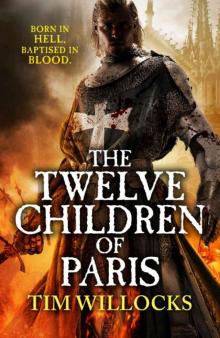 Tannhauser 02: The Twelve Children of Paris
Tannhauser 02: The Twelve Children of Paris The Religion
The Religion Tim Willocks
Tim Willocks Doglands
Doglands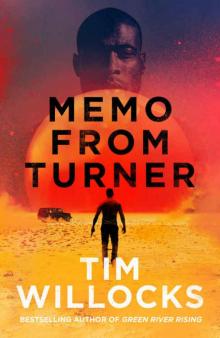 Memo From Turner
Memo From Turner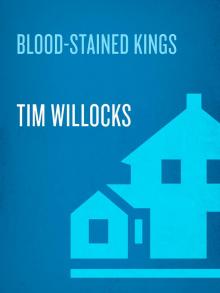 Bloodstained Kings
Bloodstained Kings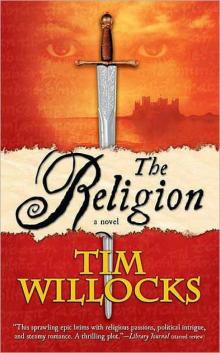 The Religion: A Novel
The Religion: A Novel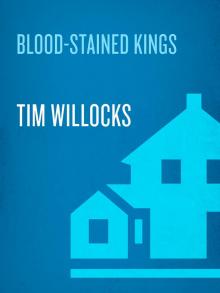 Blood-Stained Kings
Blood-Stained Kings Religion: A Novel
Religion: A Novel